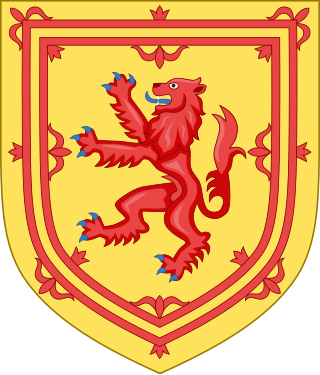
The Scottish Government is the devolved government of Scotland. It was formed in 1999 as the Scottish Executive following the 1997 referendum on Scottish devolution.

The Crown Office and Procurator Fiscal Service is the independent public prosecution service for Scotland, and is a Ministerial Department of the Scottish Government. The department is headed by His Majesty's Lord Advocate, who under the Scottish legal system is responsible for prosecution, along with the area procurators fiscal. In Scotland, virtually all prosecution of criminal offences is undertaken by the Crown. Private prosecutions are extremely rare.

Public bodies of the Scottish Government are organisations that are funded by the Scottish Government. They form a tightly meshed network of executive and advisory non-departmental public bodies ("quangoes"); tribunals; and nationalised industries. Such public bodies are distinct from executive agencies of the Scottish Government, as unlike them they are not considered to be part of the Government and staff of public bodies are not civil servants, although executive agencies are listed in the Scottish Government's directory of national public bodies alongside other public bodies.

Queensland Health is the name of the overall public health service in the state of Queensland, Australia. Like all other states and territories in Australia, the Queensland Government provides low- or no-cost primary, secondary, and tertiary health services to eligible citizens, residents and visitors through general government taxation and Medicare.

The Independent Police Complaints Commission (IPCC) was a non-departmental public body in England and Wales responsible for overseeing the system for handling complaints made against police forces in England and Wales.

The Scottish Government Education Directorates were a group of the civil service directorates in the Scottish Government. The Directorates were titled Children, Young People and Social Care; Schools; and Lifelong Learning. They were responsible for education in Scotland; social work care for children and young people and lifelong learning. In December 2010 these functions were taken on by the Learning and Justice Directorates.

A children's hearing is part of the legal and welfare systems in Scotland; it aims to combine justice and welfare for children and young people. As of 31 March 2020, 8,875 of Scotland's children were subject to a compulsory supervision order.
In England, the First-tier Tribunal , more commonly known as the Mental Health Tribunal, is an independent quasi-judicial body established to safeguard the rights of persons subject to the Mental Health Act 1983. It provides for consideration of appeals against the medical detention or forced treatment of a person who was deemed to be suffering from a mental disorder that was associated with a risk to the health or safety of that person or others.
The Health and Social Care Select Committee is a Departmental Select Committee of the British House of Commons, the lower house of the United Kingdom Parliament. Its remit is to examine the policy, administration and expenditure of the Department of Health and Social Care (DHSC) and its associated agencies and public bodies. The Clerks of the Committee are Previn Desai and Joanna Dodd.
The Scottish Public Services Ombudsman (SPSO) is the organisation that handles complaints about public services in Scotland. The Ombudsman service is independent of government and with a duty to act impartially.

The Cabinet Secretary for Education and Skills, commonly referred to as the Education Secretary, is a position in the Scottish Government Cabinet responsible for all levels of education in Scotland. The Cabinet Secretary is supported by the Minister for Further Education, Higher Education and Science and the Minister for Children and Young People which are both junior ministerial posts.
Manitoba Justice, or the Department of Justice, is the provincial government department responsible for administering the Crown Law justice systems in the province of Manitoba.
The New York State Office of Children and Family Services (OCFS) is an agency of the New York state government within the Department of Family Assistance. The office has its headquarters in the Capital View Office Park in Rensselaer.

An ombudsman, ombud, ombuds, ombudswoman, ombudsperson or public advocate is an official who is usually appointed by the government or by parliament to investigate complaints and attempt to resolve them, usually through recommendations or mediation.

The Department for Education (DfE) is a department of His Majesty's Government responsible for child protection, child services, education, apprenticeships and wider skills in England.
Civilian oversight, sometimes referred to as civilian review or citizen oversight, is a form of civilian participation in reviewing government activities, most commonly accusations of police misconduct. Members of civilian oversight or civilian review boards are generally not employed by the government entity which they are reviewing. These groups are tasked with direct involvement in the citizen complaints process and develop solutions to improve government accountability. Responsibilities of civilian oversight groups can vary significantly depending on the jurisdiction and their ability to become influential. Oversight should not simply criticize but should improve government through citizen support for government responsiveness, accountability, transparency, and overall efficiency.
A children's ombudsman, children's commissioner, youth commissioner, child advocate, children's commission, youth ombudsman or equivalent body is a public authority in various countries charged with the protection and promotion of the rights of children and young people, either in society at large, or in specific categories such as children in contact with the care system. The agencies usually have a substantial degree of independence from the executive, the term is often used differently from the original meaning of ombudsman, it is often an umbrella term, often used as a translation covention or national human rights institutions, dealing with individual complaints, intervening with other public authorities, conducting research, and – where their mandate permits them to engage in advocacy – generally promoting children's rights in public policy, law and practice. The first children's commissioner was established in Norway in 1981. The creation of such institutions has been promoted by the United Nations Committee on the Rights of the Child, and, from 1990 onwards, by the Council of Europe.

Children's Hearings Scotland is an executive non-departmental public body of the Scottish Government, responsible for aspects of the administration of the country's system of children's hearings. It recruits, trains and supports the volunteers who sit on the panels that hear cases brought to it by the Scottish Children's Reporter Administration.
The Independent Office for Police Conduct (IOPC) is a non-departmental public body in England and Wales which, since 8 January 2018, is responsible for overseeing the system for handling complaints made against police forces in England and Wales. Most allegations of police misconduct are investigated by police forces' own professional standards departments. However the IOPC does conduct independent investigations of serious allegations of misconduct or criminal offences by police officers and other law enforcement officers. 'Mandatory' referrals are usually made to the IOPC should a person die or sustain serious injuries following police contact. Additionally, a force's professional standards department may also make a 'voluntary' referral – in which a force will ask the IOPC to consider if they wish to investigate independently, supervise a force professional standards investigation, or decline and refer the investigation back to the force to investigate without any IOPC input. The office received over 4300 referrals from police forces and completed about 700 investigations in the 2019/20 year.







